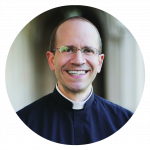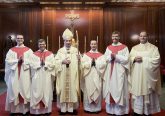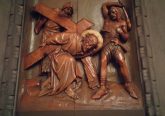A Question of Faith: Mass Offerings
What does it mean when a priest says a Mass is being offered for a person?
As part of the prayers of the Mass, the priest may offer a Mass for a particular intention, which is often for the repose of a deceased person’s soul, though Masses can be offered for the intentions of the living.
THE GRACES OF THE MASS
The celebration of the Mass is among the Church’s most powerful and efficacious prayers. In it, the Church prays in union with Christ and brings to Him the needs of individuals, communities and societies. The people call to mind their intentions during the Mass, which is most evident in the Prayers of the Faithful and in each of the Eucharistic prayers, where the faithful pray explicitly for the living and the dead.
PRAYERS FOR THE DECEASED
An early Church tradition was offering prayers for the deceased, as seen on some early Christian tombs that bear inscriptions asking for prayers for the dead. This soon led to the practice of honoring the dead and praying for their repose on the anniversary of their deaths. We know this custom was widespread in the early Church, as evidenced by St. Monica’s final request of her son, St. Augustine: “The only thing I ask of you is that you remember me at the altar of the Lord wherever you may be” (St. Augustine, Confessions, IX, 11).
THE OFFERING
A small offering usually accompanies a Mass intention. In the Archdiocese of Cincinnati, the suggested amount is five dollars, though more can be given and less can be accepted. The small sum is meant for the Church’s needs, connecting the person requesting the Mass intention to the work of the priest and parish. It, therefore, creates an obligation that the priest must satisfy.
However, this does not mean that the Mass was purchased, nor that the Mass’s prayers are offered only for that single intention. Moreover, not all Masses may have a particular intention. All pastors are required to offer a weekend Mass for the intentions of his parishioners – without any financial offering attached.
NAMING THE INTENTION
Arranging a Mass offering can be seen as a thoughtful and meaningful response to illness or death, or even a birthday or wedding anniversary. In some places, Mass cards are provided to the person or family for whom the Mass is offered. This furthers the Mass’s prayers by inviting prayers from those connected to the intention, such as the deceased’s children or spouse.
In many parishes, the intention is stated aloud, often included in the Prayers of the Faithful when the person’s name precedes “for whom this Mass is offered.” The intention, however, need not be vocalized. It is sufficient for the priest himself to be mindful of it as he offers the Mass.
While not always well understood, this early Church practice of offering Masses for particular needs reminds us of the Mass’s efficacy and how prayer transcends time and place, connecting the living and the dead, all of whom benefit from the prayers offered at the Mass.

Father David Endres is associate professor of Church history and historical theology at Mount St. Mary’s Seminary & School of Theology.
This article appeared in the May 2022 edition of The Catholic Telegraph Magazine. For your complimentary subscription, click here.













